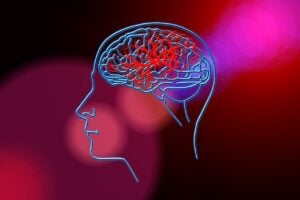Understanding UTIs in Older Adults
A urinary tract infection occurs when bacteria — most often E. coli — enter the urinary system.
For younger adults, symptoms are usually clear: burning when urinating, frequent urges, or cloudy urine.
But in older adults, particularly those with dementia, the infection can trigger sudden confusion, agitation, or personality changes rather than pain or fever.
The brain of someone with dementia is already vulnerable. When infection sets in, the body’s immune response can amplify inflammation in the brain, causing temporary but dramatic changes in behavior or awareness — a condition called delirium.
It can appear as a sudden worsening of dementia, but it’s often reversible once treated.
Why Symptoms Can Be So Misleading
Amazon: Prevent Alzheimer’s / Dementia
- Organic Turmeric Powder
- Omega 3 Supplements
- Diet & Alzheimer’s
- Prevention Guides
- Turmeric Curcumin Supplement
FREE! Weekly Diet Tips:
People with dementia often cannot describe discomfort or pain. As a result, caregivers may notice behavioral changes first, such as:
- Sudden increase in confusion or disorientation
- New or worsened agitation, aggression, or anxiety
- Unusual sleepiness or withdrawal
- Decline in appetite or loss of interest in activities
- Worsening incontinence or frequent trips to the bathroom
These changes can appear “overnight,” leading caregivers to think the dementia has rapidly progressed. In many cases, though, it’s a treatable infection.
Getting the Right Diagnosis
Because symptoms can mimic other conditions, it’s essential to confirm a diagnosis through a healthcare professional. Key steps include:
- Urine test: A simple urine sample can detect bacteria or white blood cells signaling infection.
- Medical review: A clinician checks whether confusion is infection-related or due to dehydration, medications, or other causes.
- Prompt treatment: When confirmed, antibiotics are often prescribed. Once treatment begins, mental clarity may improve within days.
Even after antibiotics, confusion may take time to subside. Encourage hydration, rest, and reassurance during recovery.
Preventing Future Infections
Older adults — especially women and those who are bed-bound or incontinent — are more prone to UTIs.
Practical prevention includes:
- Encourage hydration. Aim for six to eight cups of water daily (if allowed by doctor).
- Promote regular bathroom visits. Don’t delay urination; this helps flush bacteria.
- Maintain hygiene. Wipe from front to back; use gentle, unscented wipes if needed.
- Change briefs promptly. Wet or soiled garments create a breeding ground for bacteria.
- Review medications. Some drugs cause dehydration or urinary retention.
- Support mobility. Even light exercise helps bladder health and circulation.
These are realistic, life-tested ways to reduce infections while easing the daily routine.
Caring Through the Confusion
During a UTI, a person with dementia may not recognize loved ones, may wander, or speak irrationally.
This can be frightening — but it’s usually temporary. Caregivers can help by:
- Stay calm and reassuring. Your tone matters more than your words.
- Provide familiar comfort. Favorite music, soft lighting, or familiar photos can soothe anxiety.
- Limit overstimulation. Keep the environment peaceful and predictable.
- Offer fluids often. Even small sips aid recovery.
- Track behavior changes. Note what improves or worsens daily and share with the care team.
When to Seek Immediate Help
If your loved one has any of the following, contact a doctor promptly:
- Fever, chills, or back pain
- Sudden inability to walk, talk, or stay awake
- Refusal to drink or take medication
- Signs of dehydration (dry mouth, dizziness, dark urine)
Quick medical attention can prevent complications like kidney infection or sepsis.
The Bigger Picture
For caregivers, knowing that a sudden change in mood or awareness could be a UTI — not dementia progression — is empowering.
A simple urine test and early treatment can restore comfort, reduce distress, and sometimes even bring back a loved one’s clarity.
When behavior shifts suddenly, think infection first — not decline.











